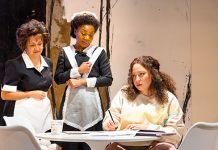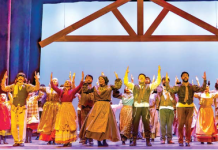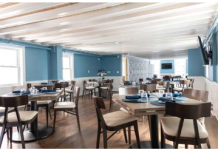By Philip Dorian
French dramatist Jean-Baptiste Poquelin (better-known as Moliere)’s plays marked the beginning of modern French comedy.
Moliere went beyond Commedia dell’ Arte stereotypes, creating characters and situations audiences could identify with rather than just observe. Two River Theater Company’s well-conceived production of his first success (in 1662), “The School for Wives,” is as involving as it is entertaining.
Moliere’s plays, like Shakespeare’s, travel well (if not always advisedly). This “School for Wives” is set in 1959, and why not? Its themes of gender roles, jealousy, lust and such have survived the 300-year gap and will the next 300 as well.
In an effort to mold his perfect wife, Arnolphe (Robert Stanton) arranged for his ward Agnes (Phillipa Soo) to be reared from the age of 4 in a convent “far from the haunts of man” so that she’d emerge totally innocent at marriageable age. (That she thinks babies are “begotten through the ear” is a stretch, but it makes the point.)
Arnolphe then installs Agnes in his country house, isolating her from outside contact, a condition entrusted to a pair of bumbling servants, played with delicious deviltry by real-life sister and brother, Bree Elrod and Carson Elrod. Inevitably, Agnes encounters a young swain, Horace, and experiences stirrings of the non-aural variety.
Unaware that Arnolphe is Agnes’s virtual captor, Horace reveals his courting plans to the man, leading to some of the play’s funniest exchanges. (Horace denounces the “jealous idiot…old fool” while Arnolphe frets “Oh, death” and “What a bitter pill…” in asides.) Thanks to some late-revealed coincidences, a common technique among classic comedies, the play wraps up as you might expect.
Two River sidestepped the potential ick factor (significantly older man lusting after a teen girl) by casting the relatively young Stanton, whose lanky frame and elastic countenance are all the props he needs. A foolish and unrealistic Arnolphe is more palatable than a lecherous one. Ms. Soo’s Agnes is genuinely sweet and certainly innocent. Her reading of the repressive “Maxims of Marriage or The Duties of a Married Woman” is remarkably poignant, and one cheers when she later proves that in matters of the heart, “A foolish girl can best the wisest man.”
Korey Jackson is a robust Horace, saved from despair by those last-minute coincidences. Steven Rattazzi’s turn as an over-the-top Notary (a Moliere fixture) earns his exit applause, and Billy Eugene Jones and Keith Reddin lend able support as friends of Arnolphe.
Mark Wing-Davey directs with a firm hand. The realized characters are flesh and blood and the pace is quick.
Moliere’s play, masterfully translated by Richard Wilbur, is in rhyming couplets, which can become singsongy, but not here. The dialogue flow is such that when the rhyming does become obvious, it’s a special delight. (Adding the presence of a character who is only mentioned in the play – and as deceased at that – is a distraction, as is an extraneous wordless coda that defies analysis.)
David Gallo’s set makes excellent use of the revolving stage. The exterior is like a gingerbread creation; inside is a pleasant garden and enough doorways to accommodate a farce.
Some of the speeches are lengthy and complex. “How could they memorize all that?” someone exclaimed on opening night. Well, they could, so get yourself to “The School for Wives” and be glad they did.
“The School for Wives,” through Oct. 5 at Two River Theater, Bridge Avenue, Red Bank. Performances: 1 and 7 p.m. Wednesdays; 8 p.m. Thursdays and Fridays; 3 and 8 p.m. Saturdays; and 3 p.m. Sundays. Information, reservations: 732-345-1400 or at www.tworivertheater.org.














